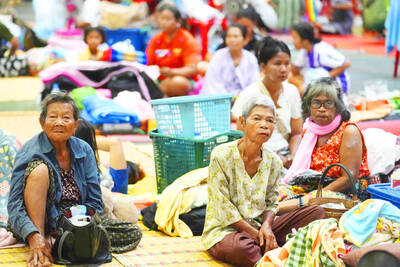Iranian President Mahmoud Ahmadinejad said yesterday that Tehran was ready for dialogue with the US as long as there is a climate of mutual respect.
“It is clear that the change must be fundamental and not tactical,” Ahmadinejad said in a speech marking the 30th anniversary of the Islamic revolution broadcast live on state television.
“The Iranian nation will welcome true changes and is ready for dialogue in a climate of equality and mutual respect,” he said.
The comments came a day after US President Barack Obama renewed his call for direct US dialogue with the Islamic republic after 30 years of severed ties.
“I think there’s the possibility, at least, of a relationship of mutual respect and progress,” Obama said, but “it’s time now for Iran to send some signals that it wants to act differently.”
Obama said his administration was looking for a new approach despite concerns over Iran’s nuclear ambitions, support for Hamas and Hezbollah and bellicose remarks aimed at Israel.
“The world does not want the dark era of [former US president George W. Bush] to be repeated,” Ahmadinejad said. “If some people seek to repeat that experience … they should know they will face a much worse fate than Bush’s.”
During his presidency, Bush famously described Iran as part of an “axis of evil” along with Saddam Hussein’s Iraq and North Korea, while Iranian leaders frequently refer to the US as the “Great Satan.”
“The threats against the Iranian people have been now removed with their resistance and help of God,” Ahmadinejad said. “I officially announce that Iran today is a real and true superpower,” the president said, referring to the country’s “scientific achievements” over the past few years.
Iran yesterday celebrated 30 years of the Islamic revolution that toppled the US-backed shah, showcasing a replica of its first domestically-built satellite, Omid (“Hope”) it launched on Feb. 2.
Ties between the US and Iran were severed in the wake of the revolution when Islamist students held diplomats hostage at the US embassy in Tehran for 444 days.

FOREST SITE: A rescue helicopter spotted the burning fuselage of the plane in a forested area, with rescue personnel saying they saw no evidence of survivors A passenger plane carrying nearly 50 people crashed yesterday in a remote spot in Russia’s far eastern region of Amur, with no immediate signs of survivors, authorities said. The aircraft, a twin-propeller Antonov-24 operated by Angara Airlines, was headed to the town of Tynda from the city of Blagoveshchensk when it disappeared from radar at about 1pm. A rescue helicopter later spotted the burning fuselage of the plane on a forested mountain slope about 16km from Tynda. Videos published by Russian investigators showed what appeared to be columns of smoke billowing from the wreckage of the plane in a dense, forested area. Rescuers in

‘ARBITRARY’ CASE: Former DR Congo president Joseph Kabila has maintained his innocence and called the country’s courts an instrument of oppression Former Democratic Republic of the Congo (DR Congo) president Joseph Kabila went on trial in absentia on Friday on charges including treason over alleged support for Rwanda-backed militants, an AFP reporter at the court said. Kabila, who has lived outside the DR Congo for two years, stands accused at a military court of plotting to overthrow the government of Congolese President Felix Tshisekedi — a charge that could yield a death sentence. He also faces charges including homicide, torture and rape linked to the anti-government force M23, the charge sheet said. Other charges include “taking part in an insurrection movement,” “crime against the

POINTING FINGERS: The two countries have accused each other of firing first, with Bangkok accusing Phnom Penh of targeting civilian infrastructure, including a hospital Thai acting Prime Minister Phumtham Wechayachai yesterday warned that cross-border clashes with Cambodia that have uprooted more than 130,000 people “could develop into war,” as the countries traded deadly strikes for a second day. A long-running border dispute erupted into intense fighting with jets, artillery, tanks and ground troops on Thursday, and the UN Security Council was set to hold an emergency meeting on the crisis yesterday. A steady thump of artillery strikes could be heard from the Cambodian side of the border, where the province of Oddar Meanchey reported that one civilian — a 70-year-old man — had been killed and

POLITICAL PATRIARCHS: Recent clashes between Thailand and Cambodia are driven by an escalating feud between rival political families, analysts say The dispute over Thailand and Cambodia’s contested border, which dates back more than a century to disagreements over colonial-era maps, has broken into conflict before. However, the most recent clashes, which erupted on Thursday, have been fueled by another factor: a bitter feud between two powerful political patriarchs. Cambodian Senate President and former prime minister Hun Sen, 72, and former Thai prime minister Thaksin Shinawatra, 76, were once such close friends that they reportedly called one another brothers. Hun Sen has, over the years, supported Thaksin’s family during their long-running power struggle with Thailand’s military. Thaksin and his sister Yingluck stayed